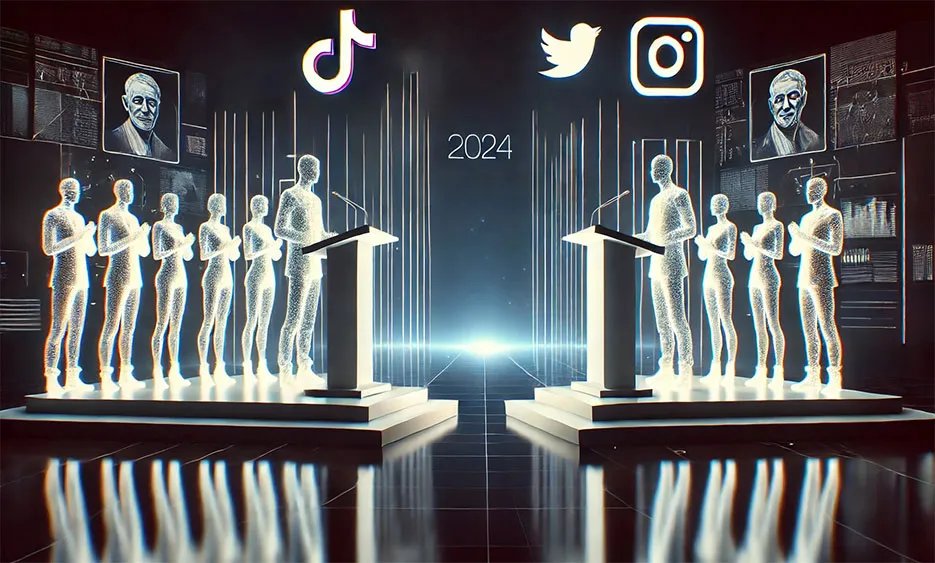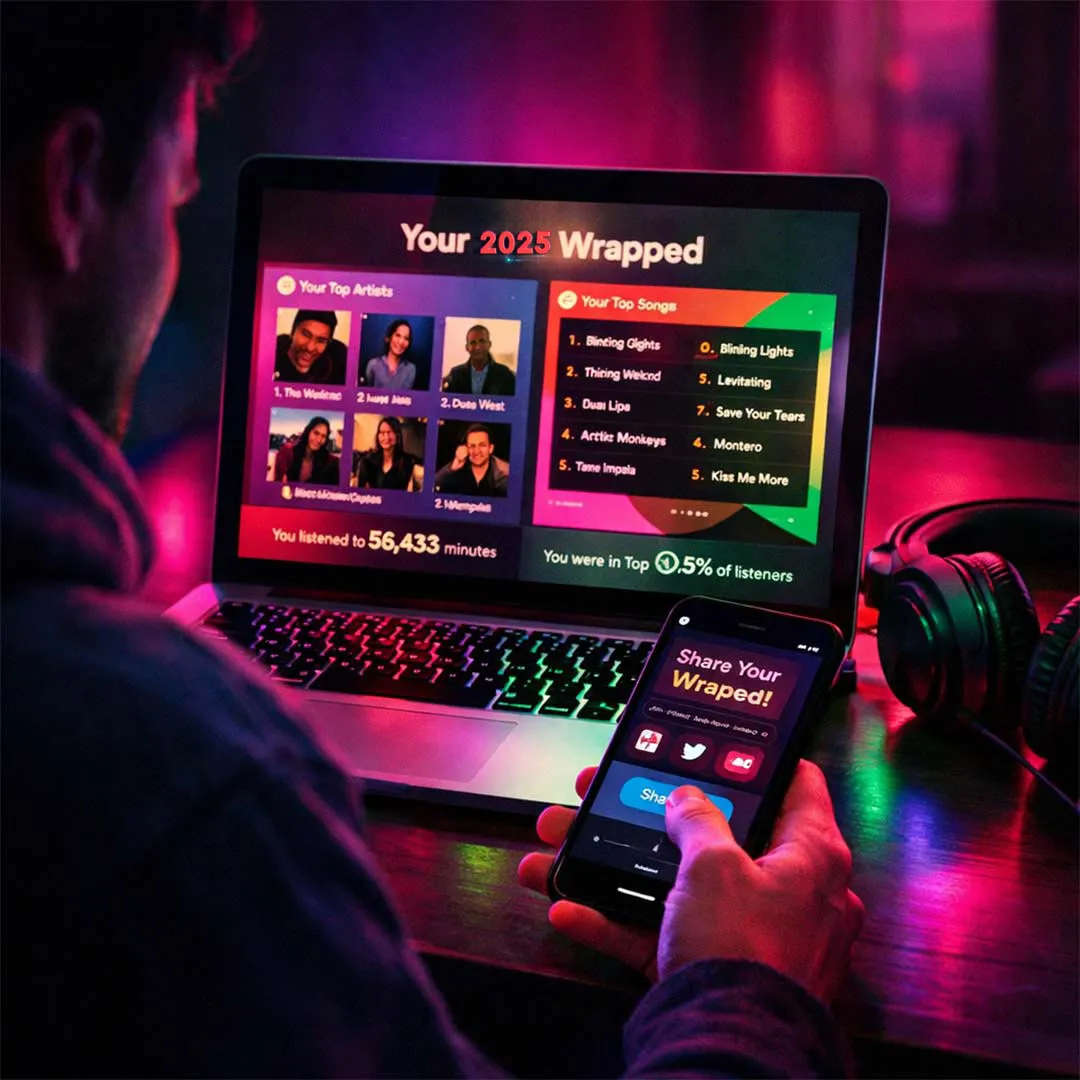
Prominente und Influencer im US-Wahlkampf 2024: Ein umfassender Überblick
4. November 2024
Die Influencer im US-Wahlkampf nehmen an Bedeutung zu. Denn die US-Präsidentschaftswahl 2024 steht bevor, und beide großen Parteien intensivieren ihre Marketing- und PR-Strategien. Die Republikaner und die Demokraten setzen vermehrt auf Prominente und Influencer, um Wähler zu mobilisieren. Außerdem möchten sie so ihre digitale Reach erhöhen und die öffentliche Wahrnehmung positiv beeinflussen. In diesem Artikel beleuchten wir die Strategien beider Parteien und untersuchen die Auswirkungen dieser Ansätze.
Republikanische Partei
Die Republikaner erkennen zunehmend den Wert von Prominenten und Influencern im Wahlkampf. Sie nutzen dies besonders, um spezifische Wählersegmente zu erreichen. In diesem Wahlzyklus verfolgen sie eine mehrschichtige Strategie:
1. Nutzung von Social-Media-Influencern
Konservative Influencer auf X, Instagram und TikTok verbreiten Kampagnenbotschaften und spielen eine zentrale Rolle. Diese Influencer reichen von bekannten politischen Kommentatoren bis zu „Micro-Influencern“ mit treuen, spezialisierten Zielgruppen. Ihre oft persönlichen und ehrlichen Inhalte mobilisieren effektiv die Basisunterstützung. Zudem sprechen sie jüngere Wähler an, die sich von traditionellen Medien abwenden.
2. Prominente Unterstützung
Bekannte Persönlichkeiten wie Kid Rock, Jon Voight und Kirstie Alley unterstützen öffentlich republikanische Kandidaten. Sportler und ehemalige Athleten werden ebenfalls eingebunden, um ein patriotisches Publikum zu erreichen. Dieses Publikum schätzt traditionelle amerikanische Ideale und Werte. Solche Unterstützungen lassen die Kandidaten menschlicher wirken und machen ihre Programme zugänglicher.
3. Gezielte Medienkampagnen
Prominente in Radio-, Digital- und Event-Werbung erzeugen starke Resonanz, besonders in umkämpften Bundesstaaten. Die Zusammenarbeit mit bekannten Stimmen hilft, politische Positionen hervorzuheben. Gleichzeitig fügt sie eine persönliche Note hinzu, die direkt an die Wähler gerichtet ist.
Demokratische Partei
Die Demokraten setzen weiterhin auf ihren traditionellen Vorteil, nämlich der Beistand durch Berühmtheiten. Sie profitieren stark von dieser breiten Unterstützung, die Unterhaltungs- und Kulturschaffende bieten:
1. Hollywood und Spendenaktionen
Die Demokraten pflegen enge Verbindungen zu A-List-Stars wie Meryl Streep, George Clooney und Oprah Winfrey. Diese Prominenten veranstalten oft hochkarätige Spendenveranstaltungen und ziehen mediale Aufmerksamkeit sowie finanzielle Mittel an. Solche Events kombinieren politische Diskussionen mit Unterhaltung und steigern dadurch das öffentliche Interesse.
2. Zusammenarbeit mit der Musikbranche
Die Demokraten setzen auf strategische Kooperationen mit populären Künstlern, ein Markenzeichen ihrer Kampagnen. Von konzert-basierten Initiativen zur Wählerregistrierung bis zu prominenten „Get-out-the-vote“-Aktionen nutzen sie verschiedene Mittel. Die Partei greift auf die Einflusssphäre von Musikern zurück, um jüngere, kulturell verbundene Zielgruppen anzusprechen.
3. Digitale Integration und Social Media
Die Demokraten bauen Beziehungen zu einflussreichen YouTube-Schöpfern, Podcastern und Social-Media-Persönlichkeiten auf. Virale Kampagnen, Kurzvideos und Live-Fragerunden mit Prominenten sind dabei gängige Taktiken. Diese Strategien halten Relevanz und Begeisterung aufrecht und stellen sicher, dass Kampagneninhalte digital im Mittelpunkt stehen.
Wichtige Trends und Veränderungen 2024
Im Jahr 2024 setzen beide Parteien stärker auf Authentizität und Glaubwürdigkeit, weil moderne Wähler echte Interaktionen schätzen. Moderne Wähler bevorzugen gemeinsame Überzeugungen bei prominenten Unterstützungen. Prominente, die nur Skripte ablesen, wirken weniger überzeugend und verstärken den Trend zu authentischen Partnerschaften.Eine bedeutende Veränderung ist auch die Vielfalt der Repräsentation. Um die diverse Wählerschaft anzusprechen, arbeiten Parteien mit Influencern und Prominenten aus verschiedenen Hintergründen zusammen. Dadurch signalisieren sie den Wählern, dass ihre Stimmen und Perspektiven wichtig sind.Ein weiterer kritischer Punkt ist die Transparenz bei der Kampagnenfinanzierung. Gesetzliche Vorschriften für bezahlte Unterstützungen erfordern klare Offenlegungen. Parteien müssen die Finanzgesetze strikt einhalten, um rechtliche Probleme zu vermeiden und Vertrauen zu sichern.
Herausforderungen und Kontroversen
Prominente Unterstützung bringt 2024 auch Herausforderungen und Kontroversen mit sich. Ein zentrales Risiko sind mögliche Gegenreaktionen. Prominente Unterstützungen können Wähler entfremden, die ihre politische Haltung ablehnen. Die Authentizität dieser Unterstützungen steht verstärkt im Fokus, weil Wähler genau beurteilen, ob sie aufrichtig oder opportunistisch wirken.Zudem besteht die Gefahr von Falschinformationen, wenn Influencer politische Themen ansprechen. Hier müssen Parteien sicherstellen, dass alle verbreiteten Inhalte korrekt sind. Inhalte müssen auch den Kampagnenfinanz- und Werbegesetzen entsprechen. Der Einsatz von Deepfakes und digital manipulierten Inhalten stellt eine zusätzliche Herausforderung dar.Ein weiterer kritischer Punkt ist die Transparenz bei der Kampagnenfinanzierung. Gesetzliche Vorschriften für bezahlte Unterstützungen erfordern klare Offenlegungen. Parteien müssen die Finanzgesetze strikt einhalten, um rechtliche Probleme zu vermeiden und Vertrauen zu sichern.
Die Performance messen
Man kann die Performance bzw. Wirkung von Prominenten- und Influencer-Kampagnen anhand digitaler Metriken wie Likes, Shares und Kommentaren messen. Auch die Zahl der registrierten Wähler dient als wichtiger Erfolgsindikator für diese Kampagnen. Der Einfluss solcher Aktionen zeigt sich auch in den Spendeneinnahmen der Parteien. Prominente Spendenaktionen tragen erheblich zur Parteienfinanzierung bei. Ein Vergleich der erzielten Beträge verdeutlicht die finanziellen Vorteile solcher Kampagnen.Am bedeutendsten sind jedoch die Veränderungen im Wählerverhalten, die sich durch Analysis von Umfragedaten zeigen. Nachwahlstudien können aufzeigen, wie die Unterstützung durch Prominente die Meinung und das Verhalten der Wähler beeinflusst.
Conclusion
Im Wahlkampf 2024 setzen Parteien Prominente und Influencer strategischer und zielgerichteter ein als zuvor. Republikaner und Demokraten nutzen diese Unterstützung, um Wähler effektiver zu mobilisieren und stärker zu engagieren. Authentizität und Resonanz der Strategien spielen dabei eine entscheidende Rolle für den Erfolg. Die Balance zwischen wirkungsvollen Partnerschaften und authentischen Botschaften ist besonders wichtig. Diese Balance bestimmt, wie erfolgreich sie moderne Wähler erreichen und überzeugen können.
Our blog
Latest news
With our blog, you are always close to our work, our current projects and the latest trends and developments in web and print.
Any questions?





